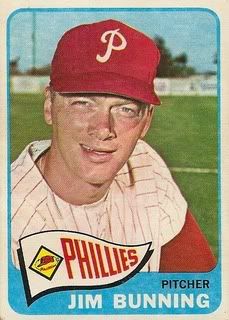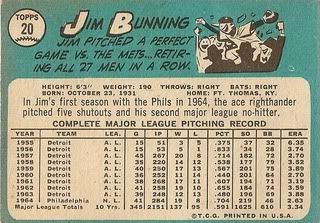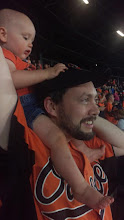
Fun facts about Jim Bunning:
-A native of Southgate, KY, Jim was a teenager when he signed with the Tigers in 1950. He later completed a bachelor's degree in economics at Xavier University.
-He was 23 when he debuted with Detroit in July 1955. However, he didn't spend a full season in the majors until 1957, his eighth year as a pro.
-Bunning was worth the wait for the Tigers, going 20-8 with a 2.69 ERA in 1957 and leading the American League in wins and innings pitched (267.1). He made the first of seven All-Star teams.
-On July 20, 1958, he no-hit the Red Sox, allowing just two walks while striking out a dozen Boston batters.
-After seven straight seasons of double-digit wins for the Tigers and a couple of strikeout crowns (201 each in 1959 and 1960), Jim was traded to the Phillies prior to the 1964 season.
-The righthander accomplished a rare feat on June 21, 1964, hurling a perfect game against the Mets. He struck out 10 batters in becoming one of the few men to pitch no-hitters in both the American and National Leagues.
-Though he won 19 games in each of his first three seasons with the Phils, Bunning's career year came in 1967, when he was just 17-15 for a mediocre squad. He had a career-best 2.29 ERA and 16 complete games, and was the league leader with 40 starts, 6 shutouts, 302.1 innings pitched, and 253 strikeouts. He finished a distant second in Cy Young voting to the Giants' Mike McCormick, who had a gaudy 22-10 record but inferior peripherals (2.85 ERA, 150 strikeouts).
-Late in his career, Jim had brief stints with the Pirates and Dodgers before returning to the Phillies and retiring in 1971. In parts of 17 seasons, he was 224-184 with 151 complete games, 40 shutouts, and a 3.27 ERA. His 2,855 strikeouts were second only to Walter Johnson at the time, and he currently ranks 17th in batters whiffed. He was the second pitcher (following Cy Young) to ever record 100 wins and 1,000 strikeouts in both the American and National Leagues.
-He managed in the Phillies farm system from 1972-1976, making stops in Reading, Eugene, Toledo, and Oklahoma City. He was inducted into the Baseball Hall of Fame in 1996 as a Veteran's Committee selection, and the Phillies retired his #14 in 2001.
-As mentioned above, Bunning went into a successful career in politics. He represented Kentucky in the U.S. House of Representatives from 1987-1999 and went on to serve two terms in the U.S. Senate, finally bidding Congress farewell earlier this year after choosing not to run for reelection.



No comments:
Post a Comment